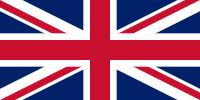
The politics of the United Kingdom functions within a constitutional monarchy where executive power is delegated by legislation and social conventions to a unitary parliamentary democracy. From this a hereditary monarch, currently Charles III, serves as head of state while the Prime Minister of the United Kingdom, currently Rishi Sunak, serves as the elected head of government.

The West Lothian question, also known as the English question, is a political issue in the United Kingdom. It concerns the question of whether MPs from Northern Ireland, Scotland and Wales who sit in the House of Commons should be able to vote on matters that affect only England, while neither they nor MPs from England are able to vote on matters that have been devolved to the Northern Ireland Assembly, the Scottish Parliament and the Senedd. The term West Lothian question was coined by Enoch Powell MP in 1977 after Tam Dalyell, the Labour MP for the Scottish constituency of West Lothian, raised the matter repeatedly in House of Commons debates on devolution.
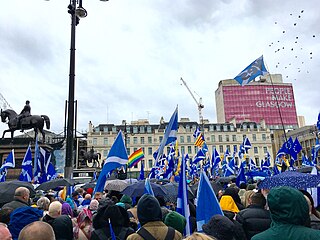
Scottish independence is the notion of Scotland as a sovereign state, independent from the United Kingdom, and refers to the political movement that is campaigning to bring it about.
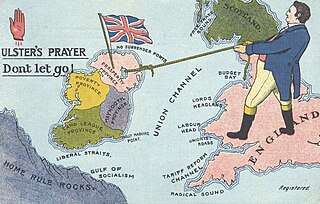
Unionism in Ireland is a political tradition that favouring union with Great Britain professes loyalty to the crown and constitution of the United Kingdom. The overwhelming sentiment of Ireland's Protestant minority, unionism mobilised in the decades following Catholic Emancipation in 1829 to oppose restoration of a separate Irish parliament. Since Partition in 1921, as Ulster Unionism its goal has been to retain Northern Ireland as a devolved region within the United Kingdom and to resist the prospect of an all-Ireland republic. Within the framework of the 1998 Belfast Agreement, which concluded three decades of political violence, unionists have shared office with Irish nationalists in a reformed Northern Ireland legislature and executive. Currently, they are refusing cooperation in this consociational arrangement to protest what they see as an attempt to distance Northern Ireland from Great Britain through post-Brexit trade rules.
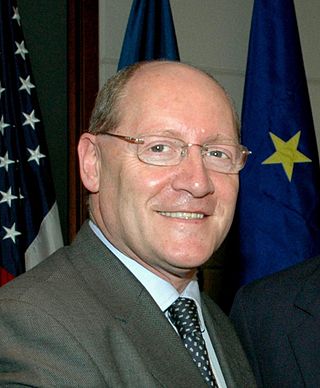
The 2004 European Parliament election was the United Kingdom's part of the wider 2004 European Parliament election which was held between 10 and 13 June 2004 in the 25 member states of the European Union. The United Kingdom's part of this election was held on Thursday 10 June 2004. The election also coincided with the 2004 local elections and the London Assembly and mayoral elections. In total, 78 Members of the European Parliament were elected from the United Kingdom using proportional representation.
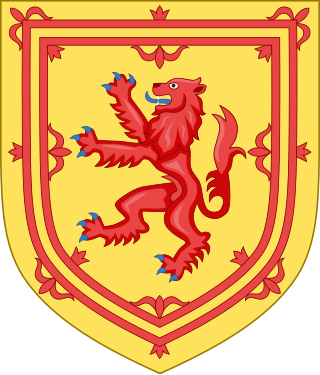
Unionism in Scotland is a political movement which favours the continuation of the political union between Scotland and the other countries of the United Kingdom, and hence is opposed to Scottish independence. Scotland is one of four countries of the United Kingdom which has its own devolved government and Scottish Parliament, as well as representation in the UK Parliament. There are many strands of political Unionism in Scotland, some of which have ties to Unionism and Loyalism in Northern Ireland. The two main political parties in the UK — the Conservatives support Scotland remaining part of the UK.

United Ireland, also referred to as Irish reunification, is the proposition that all of Ireland should be a single sovereign state. At present, the island is divided politically; the sovereign Republic of Ireland has jurisdiction over the majority of Ireland, while Northern Ireland, which lies entirely within the Irish province of Ulster, is part of the United Kingdom. Achieving a united Ireland is a central tenet of Irish nationalism and Republicanism, particularly of both mainstream and dissident republican political and paramilitary organisations. Unionists support Northern Ireland remaining part of the United Kingdom, and therefore oppose Irish unification.
A devolved English parliament is a proposed institution that would give separate decision-making powers to representatives for voters in England, similar to the representation given by the Senedd, the Scottish Parliament and the Northern Ireland Assembly. A devolved English parliament is an issue in the politics of the United Kingdom.

Ulster nationalism is a minor school of thought in the politics of Northern Ireland that seeks the independence of Northern Ireland from the United Kingdom without joining the Republic of Ireland, thereby becoming an independent sovereign state separate from both.

English independence is a political stance advocating secession of England from the United Kingdom. Support for secession of England has been influenced by the increasing devolution of political powers to Scotland, Wales and Northern Ireland, where independence from the United Kingdom is a prominent subject of political debate.

The Scottish Unionist Party (SUP) is a minor political party in Scotland. As a unionist party, it advocates keeping Scotland in the United Kingdom. It is also anti-devolution, advocating the abolition of the Scottish Parliament.
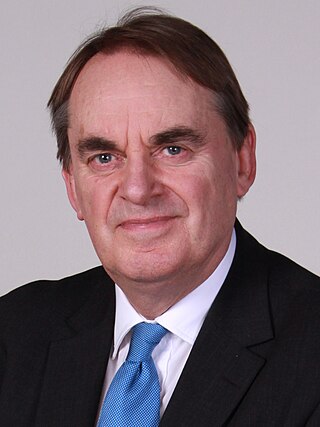
The 2009 European Parliament election was the United Kingdom's component of the 2009 European Parliament election, the voting for which was held on Thursday 4 June 2009. The election was held concurrently with the 2009 local elections in England. In total, 72 Members of the European Parliament were elected from the United Kingdom using proportional representation.

In the United Kingdom, unionism is a political stance favouring the continued unity of England, Scotland, Wales and Northern Ireland as one sovereign state, the United Kingdom of Great Britain and Northern Ireland. Those who support the union are referred to as Unionists. Though not all unionists are nationalists, UK or British unionism is associated with British nationalism, which asserts that the British are a nation and promotes the cultural unity of the Britons, which may include people of English, Scottish, Welsh, Irish, Cornish, Jersey, Manx and Guernsey descent.

The formation of the United Kingdom of Great Britain and Northern Ireland has involved personal and political union across Great Britain and the wider British Isles. The United Kingdom is the most recent of a number of sovereign states that have been established in Great Britain at different periods in history, in different combinations and under a variety of polities. Historian Norman Davies has counted sixteen different states over the past 2,000 years.

Since 1922 the United Kingdom has been made up of four countries: England, Scotland, Wales and Northern Ireland. The UK Prime Minister's website has used the phrase "countries within a country" to describe the United Kingdom. Some statistical summaries, such as those for the twelve NUTS 1 regions of the UK, refer to Northern Ireland, Scotland, and Wales as "regions". With regard to Northern Ireland, Scotland and Wales particularly, the descriptive name one uses "can be controversial, with the choice often revealing one's political preferences".
Separatism in the United Kingdom may refer to the secession of any of the countries of the United Kingdom from the union. Less significant movements for separatism within England also exist.

In the United Kingdom, devolution is the Parliament of the United Kingdom's statutory granting of a greater level of self-government to the Scottish Parliament, the Senedd, the Northern Ireland Assembly and the London Assembly and to their associated executive bodies the Scottish Government, the Welsh Government, the Northern Ireland Executive and in England, the Greater London Authority and combined authorities.

The 2014 European Parliament election was the United Kingdom's component of the 2014 European Parliament election, held on Thursday 22 May 2014, coinciding with the 2014 local elections in England and Northern Ireland. In total, 73 Members of the European Parliament were elected from the United Kingdom using proportional representation. England, Scotland and Wales use a closed-list party list system of PR, while Northern Ireland used the single transferable vote (STV).

Unionism in Wales is the political view that supports a political union between Wales and the other countries of the United Kingdom. As well as the current state of the UK, unionism may also include support for Federalism in the United Kingdom and a United Kingdom Confederation.

Federalism in the United Kingdom aims at constitutional reform to achieve a federal UK or a British federation, where there is a division of legislative powers between two or more levels of government, so that sovereignty is decentralised between a federal government and autonomous governments in a federal system.

